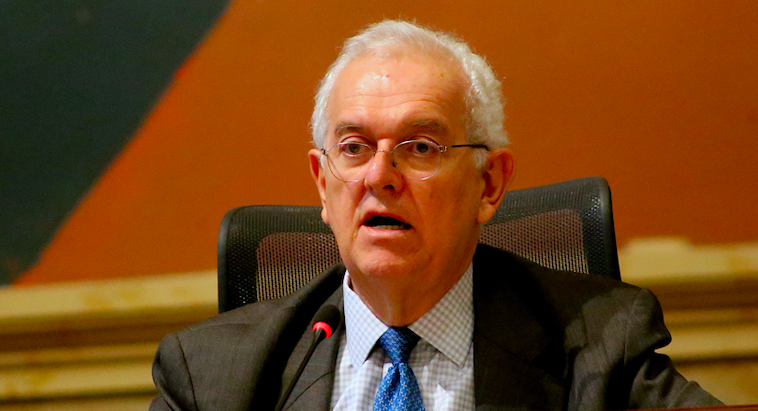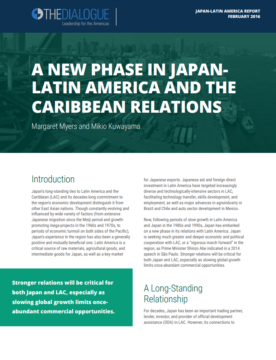Mexico: How Far Have its Institutions Really Come?
The question remains if Mexico has achieved a degree of institutional development consistent with its participation in those organizations.
A Daily Publication of The Dialogue
Revenue gains from the implementation of a historic agreement to reform the international tax system will be higher than previously expected, according to new OECD analysis released Jan. 17. The proposed global minimum tax is now expected to result in annual global revenue gains of around $220 billion, or 9 percent of global corporate income tax revenues, as opposed to a previous estimate of $150 billion. However, speaking in Davos about the tax accord, Colombian Finance Minister José Antonio Ocampo called for a Latin American regional tax plan that goes further, saying the OECD’s plan is “too limited.” With a year to go before the implementation of the OECD’s tax reforms take effect, what is the state of readiness for their implementation? Will revenue gains be as much as the OECD has forecast? Why have some Latin American countries expressed dissatisfaction with the plan, and will regional efforts such as those proposed by Colombia arrive at alternatives that meet with agreement from all stakeholders?
Angel Melguizo, founding partner of Argia and senior non-resident fellow at the Inter-American Dialogue: “The OECD remains the most technically solid and politically open effort to adapt international taxation to the 21st century by designing and implementing global rules for digital services (when users and providers are in different places), as well as a minimum income tax to fight tax evasion. Indeed, the process is slow, in particular on the taxation of businesses. This reflects not only the challenges to align 135 countries and jurisdictions, but also shows that its reach is far from limited. Meanwhile, advances on the second pillar–the establishment of a 15 percent global minimum tax—have been solid. As a consequence, according to the December KPMG track, only seven jurisdictions (notably the United States) in the world were waiting for a global solution. By contrast, 32 countries had enacted digital tax legislation (including Argentina, Colombia, Costa Rica, Mexico and Uruguay), three more were in public consultations (including Brazil), and six announced their intention to move forward (including China and Japan). I hope the OECD initiative does not lose momentum and succeeds in incorporating smart taxes on digital services. The nature of the digitalized economy is almost borderless and calls for relatively similar rules across different countries as users are located and move between them. The good news is that many countries—including the more proactive European ones—have declared they would dismantle/merge the taxes imposed should an international agreement be reached, so a global solution is still possible. Smart and updated regulations on taxes, data security and IP protection are key for a sustainable digital ecosystem.”
Carlos Vargas Alencastre, chief executive officer of TPC Group: “In 2021, 137 countries and jurisdictions integrating the Inclusive Framework on Base Erosion and Profit Shifting, including 31 Latin American and Caribbean countries, endorsed the historic international global minimum tax, subjecting multinational companies with revenues exceeding 750 million euros ($815 million) to a minimum effective tax rate of 15 percent on their generated profits. This new global tax rate will promote tax competition between countries, given that large multinationals will look favorably upon investing in jurisdictions that comply with this low tax rate since developing countries (mostly in Latin America) will try to offer the best and most attractive agreement to generate tax income and investment therein, giving rise to businesses and jobs. The task for the 31 Latin American and Caribbean member countries of the inclusive framework is to work toward the implementation of this agreement, of voluntary adhesion, through the double taxation avoidance agreements or multilateral agreements such as Decision No. 578 of the Andean Community of Nations, to participate in the tax rate and benefit from it. The impact of this new tax is clearly a step toward homogenizing the international tax system, which is necessary nowadays to face the economic Covid-19 crisis and the political instability of various Latin American countries.”
Eugenio Grageda, partner at Holland & Knight: “The OECD plan is not only comprised of a global minimum tax. It also includes Pillar 1 which, roughly put, will provide big market jurisdictions like Brazil, Colombia and Mexico the right to tax certain residual profits based on sales of big international companies in their jurisdictions. The benefits for developing countries under Pillar 1, although still unclear, should not be ‘too limited,’ and definitely greater than the ones under the proposed global minimum tax (GloBE). Yet, its implementation is still uncertain. GloBE is to be implemented domestically, not through a multilateral treaty as will be the case with Pillar 1. However, the vast majority of companies and administrations of developing countries are still waiting for the final rules and haven’t initiated the efforts to be ready when they become enforceable. Many countries still have to figure out how GloBE will cohabitate with other current domestic rules. The complexity concerns relate chiefly to how the Pillar 1 and the GloBE are administered in practice; it is especially relevant for developing states that are the ones typically with limited tax administration capacity. It is possible to end up with centralized administration processes, however, that could undermine the sovereignty of participant developing states. With respect to Pillar 1, although developing countries have supported its implementation based on the idea that it will increase their allocation of taxable profits, the dissatisfaction comes from three major concerns: limited scope, complexity and implementation barriers. They always have pressured for a reduction in the very high qualification threshold, but many perceive its implementation as unlikely because they don’t see the United States approving a measure that affects mostly U.S. companies. With respect to the GloBE, the dissatisfaction comes from the fact that it will not leave some countries substantially better off than now.”
Manuel Baltazar Mancilla, general director of Grupo México Fiscal: “One year after the international tax reforms proposed by the OECD came into force, there is widespread discontent in Latin American countries—this is logical, since there is a natural dilemma in the distribution of the proposed minimum tax, and neither party wants to give in. Developed countries believe they are entitled to a greater benefit, because they are the ones that invest in the infrastructure and maintain the assets that allow for digital commerce. However, the consumption carried out by developing countries also enables the generation of wealth. The challenge will be in finding the balance of distribution between the countries that invest in the industry and those that are the source of wealth. The projected annual global revenue is uncertain, but there is a constant growth in digital commerce, and applications generate a greater trend of use every day, contrary to established businesses, many of which continue to be displaced by generational change. It is undeniable that the constant growth of the digital economy will continue, so a consensus around distribution will have to be reached shortly.”
 The Latin America Advisor features Q&A from leaders in politics, economics, and finance every business day. It is available to members of the Dialogue’s Corporate Program and others by subscription.
The Latin America Advisor features Q&A from leaders in politics, economics, and finance every business day. It is available to members of the Dialogue’s Corporate Program and others by subscription.
The question remains if Mexico has achieved a degree of institutional development consistent with its participation in those organizations.
Despite slowing growth on both sides of the Pacific, China’s policy bank finance to Latin America reached $30 billion in 2015.
For decades, Japan has been an important trading partner, lender, investor, and provider of official development assistance in Latin America and the Caribbean.
 A global minimum tax is expected to raise hundreds of billions of dollars in revenue. However, Colombian Finance Minister José Antonio Ocampo has said the tax accord doesn’t go far enough. // File Photo: Colombian Government.
A global minimum tax is expected to raise hundreds of billions of dollars in revenue. However, Colombian Finance Minister José Antonio Ocampo has said the tax accord doesn’t go far enough. // File Photo: Colombian Government.

